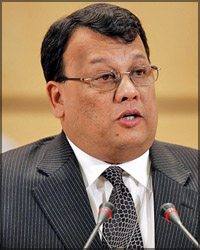Lanka: Avowed commitment to protect Human Rights
Statement by Mahinda Samarasinghe,
Minister of Disaster Management and Human Rights at Agenda Item 64 -
Promotion and Protection of Human Rights at the United Nations General
Assembly 63rd Session Third Committee on October 21, 2008.
Sri Lanka has a strong and vibrant human rights protection system. It
is a state party to the seven core-human rights treaties and is a
signatory to the new Convention on the Rights of Persons with
Disabilities. We are a state party to several other related
international instruments in the field of International Humanitarian
Law, including the four Geneva Conventions.
|

Forces welcome people from uncleared areas |
Human rights provisions in our Constitution are justiciable through
an independent judiciary firmly rooted in our long standing democratic
and legal traditions. Our National Human Rights Commission was
established more than a decade ago. My Ministry mandate is solely
dedicated to the promotion and protection of human rights. It serves as
the lead Govt. agency tasked with the promotion and co-ordination of
activities connected with human rights with Govt. institutions, in
cooperation with UN agencies and local and international NGO’s. These
mechanisms are strengthened by a vibrant free media and the very active
involvement of civil society.
Our country has implemented effective policies over the years to
ensure the economic, social and cultural rights of our people. Our
system of free education has resulted in a literacy rate on par with
developed countries. National health policies have ensured comprehensive
and free health care to the entire population. This is reflected in our
high life expectancy for men and women, and low infant mortality rates.
Poverty alleviation, housing development, empowerment of women are other
areas that have focused our attention. A national campaign for achieving
the MDG’s is also well underway and we are well ahead in reaching these
targets. President of Sri Lanka, Mahinda Rajapaksa outlined this
strategy to the UN General Assembly in the following terms:
“The Government’s objective is to enable the people to enjoy the
benefits of the democratic processes and to speed the development
activities in those areas where there is a heavy presence of terrorists.
This would be similar to the fast tracking of economic development
taking place in the Eastern Province of Sri Lanka, where former
terrorists now function as democratically elected Provincial Councillors,
and a former child soldier conscripted by the LTTE is now the elected
Chief Minister, having abandoned terrorism and embraced democracy.
Significantly, the restoration of democracy in the East of Sri Lanka was
achieved in less than one year of it being freed.”
Of course long-term durable peace cannot be ensured without political
measures aimed at addressing the problems that gave rise to the conflict
in the first place. Our Government, under the stewardship of President
Mahinda Rajapaksa, has reiterated its commitment to finding a political
solution to the practical problems of governance and development faced
by our people.
Our Government’s commitment to ensure the civil and political rights
of our people is guaranteed by the relevant provisions of Chapter III of
our Constitution as well as in other Statutes, such as the International
Covenant on Civil and Political Rights Act and other legislation in the
fields of labour, social welfare etc. As a functioning democracy,
uninterrupted holding of elections since independence has ensured the
strengthening of our political institutions.
The Govt. in its commitment to devolve power has committed itself to
fully implement the provisions of the 13th Amendment to the Constitution
that established the Provincial Council system. The All Party Conference
convened by our President is seeking to further devolve power through a
consultative process with a view to addressing the grievances of all
communities and in keeping with the Govt.’s firm commitment to
addressing grievances through a political process.
Sri Lanka’s efforts to promote and protect human rights are taking
place under difficult and trying circumstances due to the continuing
challenge posed by the terrorist group the LTTE, that operates in the
northern province albeit in an increasingly confined area. This group
continues to target innocent civilians, conscripts children,
assassinates political leaders, engages in ethnic cleansing and other
serious violations of human rights of our people.
It is important therefore to take into consideration the Govt.’s
efforts to ensure the rights of its citizens amidst these challenges
including our enacting enabling legislation to fully implement
obligations under the conventions relating to Human Rights and
humanitarian law.
At the same time our Government has remained actively engaged with
the office of the High Commissioner for Human Rights which include joint
efforts to identify, fund and implement mutually acceptable initiatives
supportive of more effective human rights protection in Sri Lanka. The
Government is also in continuous engagement with the UN system working
in areas related to human rights and humanitarian assistance with the
objective of further strengthening national capabilities and delivery
mechanisms in the country. We have also continued to fulfil our
reporting obligations to relevant treaty bodies and invited UN officials
and Special procedures/mandate holders to visit Sri Lanka.
|

Minister Mahinda Samarasinghe |
Last year we welcomed the High Commissioner for Human Rights, Under
Secretary General for Humanitarian Affairs, Special Rapporteur on
Torture and the Secretary General’s Special Representative on IDP’s. Our
Government continues this policy of open and constructive engagement
with the United Nations human rights bodies. We have also submitted
regular reports in fulfilment of our report obligations under human
rights covenants.
In May this year we submitted our national Human Rights Report for
review under the Universal Periodic Review (UPR) mechanism to the
Working Group established by the Human Rights Council for this purpose.
The Report of the UPR is reflective of the open engagement by the Govt.
with this process. This exemplifies further how we have opened ourselves
to scrutiny of multiple international mechanisms on the basis of our
belief that openness and accountability through international means can
strengthen national efforts.
Our National Human Rights Commission established as an independent
institution by an Act of Parliament also plays a pivotal role in
inquiring and investigating complaints relating to infringement of
fundamental rights. The Commission has 10 regional offices to discharge
its functions at district level. My Ministry is in consultation with the
Commission with regard to ways and means of further strengthening these
regional offices.
In terms of our Commission of Inquiry Act, the President of Sri Lanka
appointed a Commission to Investigate and Inquire into Alleged Serious
Breaches of Human Rights. This Commission is currently conducting public
inquiries following investigation by law enforcement authorities. The
Govt. has also taken cognizance of certain impediments to the conduct of
these public inquiries .In this regard
We have recognised the need to draft legislation for the protection
of victims of and witnesses of crime. A bill to this effect is currently
before Parliament. The Government hopes that the passage of this bill
will enhance public confidence in the law enforcement process and lead
to greater participation in investigations and prosecutions by the
general public. Pending the passage of this legislation we have
established a witness and victim protection unit that has gained
valuable practical experience in the methods, practices and range of
issues that will potentially be dealt with by a future formal witness
and victim protection agency.
As a country affected by terrorism it is our responsibility to also
ensure the physical safety and security of all civilians and
non-combatants, both civilian residents and IDP’s as well as
humanitarian & development workers. My Ministry chairs the Consultative
Committee on Humanitarian Assistance (CCHA) to ensure that all
humanitarian efforts are facilitated and that difficulties if any are
resolved through discussion. In this context we note the acknowledgement
of our positive action in this area by the Special Representative of the
UN Secretary General on IDP’s in his report to this Committee.
The Government of Sri Lanka has, throughout the duration of the
conflict, sent food, medicine, educational supplies and other essential
items into the affected areas. This sustained commitment, over such a
prolonged period is, perhaps unparalleled in similar situations
elsewhere. As our President stated at the UN General Assembly: “The
Government of Sri Lanka continues this humanitarian policy even today
although we know that the terrorists seize a good proportion of these
humanitarian supplies. Our supplies are not confined to food; they
extend to medicines, and all other essentials as well as schools and
hospitals, with teachers, doctors, nurses, and all other essential
staff. This is not all, the government also purchases the paddy and
other foodstuffs produced in those areas. I do not think there is any
country in the world where there is a government that provides such
humanitarian assistance to terrorists that attack it. Our Government
considers the supply of humanitarian relief to its people as its prime
responsibility.” As a practical example, over the past three weeks, the
Government has ensured the supply of approximately 2000 MT of food
relief in addition to facilitating the transport of a regular supply of
consumer goods to the so-called “uncleared areas”. We sincerely
appreciate the complementary role played by the UN and several national
and international non-governmental organisations in supporting the
Government’s efforts in this regard. The Consultative Committee on
Humanitarian Assistance (CCHA) which I chair as the Minister for Human
Rights, is a high level coordinating mechanism that brings together
government and its international partners as well as civil society
representation to discuss, initiate and implement policy on matters
connected with humanitarian assistance.
It is, perhaps, a unique model of a government-led cooperative and
consultative body that is geared to addressing a range of challenges
that arise in the context of countering a terrorist campaign waged by a
group listed as a terrorist organization by around 30 democratic
countries around the world. In connection with the protection and
promotion of human rights, we have consultative mechanisms that bring
together all actors from Government to consider and act upon issues
brought to the Government’s attention.
We also have established a forum where a advisory body comprising
representatives of Sri Lanka’s very committed, vibrant and vocal civil
society are able to put their concerns before key government actors who
then respond to these issues and take follow-up action.
In keeping with the Vienna Declaration and Programme of Action and
with the commitment given in the UPR Process, Sri Lanka has taken steps
to draft a National Plan of Action for the promotion and protection of
human rights. We are working closely with the UNDP and the senior
advisor of the UN country team which represents the office of the High
Commissioner for human rights in developing our Plan of Action.
|

Food distribution in the Wanni |
The most valuable aspect of the process of preparation is a
comprehensive assessment of the strengths and weaknesses and gaps in our
national human rights protection system that we plan to undertake. The
Plan of Action will promote capacity building for national institutions.
It will also seek to fulfil the objectives we shared with the Human
Rights Council during our recent engagement in the UPR process.
In pursuance of my mandate to coordinate humanitarian activities and
liaise with the Office of the High Commissioner and international human
rights bodies, we have recently facilitated a very productive dialogue
with UN Special Procedures and mechanisms in the field of human rights.
Our recent engagement with the Special Rapporteur on Torture and the
Secretary General’s Representative on the Human Rights of IDPs have
already borne results and we look forward to continued dialogue and
cooperation.
The incorporation into domestic law of the obligations under the
Human Rights Treaties and Conventions by the enactment of national
legislation in respect of these conventions has strengthened their
legislative implementation over the past few years.
Several administrative measures and the development of a national
institutional framework for the protection and promotion of human rights
have strengthened our capacity to implement these treaties on the
ground. Sri Lanka is also a party to the Optional Protocol to the
Convention on the Elimination of All forms of Discrimination against
Women (CEDAW), the two Optional Protocols to the Rights of the Child
Convention and the Optional Protocol to the ICCPR.
We are engaged in an effort to propose the adoption of an enlarged
and enhanced constitutional ‘Bill of Rights’ with a view to
strengthening the normative basis for human rights protection in our
country. Whilst we look to redevelop a set of national standards
relating to human rights in keeping with our social, legal and cultural
heritage, we are also acutely aware of the advances and developments in
other parts of the world.
In conclusion let me reiterate my Government’s commitment to continue
with its policy of constructive engagement and cooperation with other
Member States as well as with UN human rights bodies/institutions and
the international community in addressing human rights issues. |



